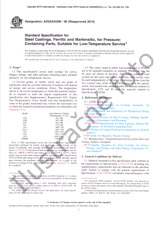Potrebujeme váš súhlas na využitie jednotlivých dát, aby sa vám okrem iného mohli ukazovať informácie týkajúce sa vašich záujmov. Súhlas udelíte kliknutím na tlačidlo „OK“.
ASTM D8386-21
Standard Test Method for Determining Enhanced Filter Blocking Tendency (EFBT)
NORMA vydaná dňa 1.4.2021
Informácie o norme:
Označenie normy: ASTM D8386-21
Dátum vydania normy: 1.4.2021
Kód tovaru: NS-1023146
Počet strán: 8
Približná hmotnosť: 24 g (0.05 libier)
Krajina: Americká technická norma
Kategória: Technické normy ASTM
Anotácia textu normy ASTM D8386-21 :
Keywords:
automotive diesel, filter blocking tendency (EFBT), filterability, gas oil, marine diesel, middle distillates,
Doplňujúce informácie
| Significance and Use |
|
5.1?This test method is intended for use in evaluating the cleanliness of middle distillate fuels for quality control purposes. 5.2?The filter media specified in this procedure is suitable for the materials in the scope. 5.3?A change in filtration performance after storage or pretreatment can be indicative of changes of fuel condition. 5.4?The filterability of fuels varies depending on filter porosity and structure. Therefore, results from this test method might not correlate with full-scale filtration; however, results from this test might help identify fuels that can reduce filter life. 5.5 Causes of poor filterability in industrial/refinery filters include fuel degradation products, contaminants (including water) picked up during storage or transfer, effects due to temperature or composition for diesel, incompatibility of commingled fuels, or interaction of the fuel with the filter media. Any of these could correlate with orifice or filter system plugging, or both. 5.6 The results of the EFBT test can range from 1 for a fuel with very good filterability, to over 30 for a fuel with poor filterability. The selection of a single EFBT number to define a pass or fail criteria is not possible, as this will be dependent on the fuel type and application specifics. The correlation between filter life and EFBT number is, therefore, dependent on many variables stemming from the design and use of the engine. Some factors like pressures and particle size removal required come from the fuel system design while others are a result of the duty cycle and environment where the engine is deployed. As an example, a large displacement HPCR (High-Pressure Common Rail) engine in continuous operation may have cleanliness needs much greater than that of a medium or light-duty engine in occasional use. In each case, the expected EFBT value may be different. An EFBT value of <1.4 for the fuel before it reaches the fuel system in the first example of HPCR engines may be suitable, while an EFBT <2.0 may be suitable in the medium/light-duty engines. In a small study, the EFBT test was shown to be more sensitive to constituents in the fuel than the Test Method D2068 method (Appendix X1). |
| 1. Scope |
|
1.1?This test method covers a procedure for the determination of the Enhanced Filter Blocking Tendency (EFBT) and the filterability of middle distillate fuel oils. This test is applicable to fuels within the viscosity range of 1.3 mm2/s to 6.0 mm2/s at 40 ?C. Note 1:?ASTM specification fuels falling within the scope of
this test method are: Specification D396 Grades No 1 and 2; Specification
D975 Grades No. 1-D S15 and
S500, and No. 2-D S15 and S500; Specification D2880 Grades No. 1-GT and No.
2-GT.
1.2?This test method has interim repeatability only. For more information, see Section 12. 1.3?This test method is not applicable to fuels that contain free (undissolved) water (see 7.3). 1.4?The values stated in SI units are to be regarded as standard. No other units of measurement are included in this standard. 1.5?This standard does not purport to address all of the safety concerns, if any, associated with its use. It is the responsibility of the user of this standard to establish appropriate safety, health, and environmental practices and determine the applicability of regulatory limitations prior to use. 1.6?This international standard was developed in accordance with internationally recognized principles on standardization established in the Decision on Principles for the Development of International Standards, Guides and Recommendations issued by the World Trade Organization Technical Barriers to Trade (TBT) Committee. |




 Cookies
Cookies
